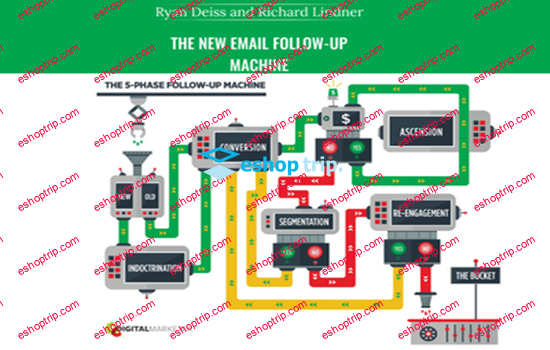Published 8/2024
MP4 | Video: h264, 1920×1080 | Audio: AAC, 44.1 KHz
Language: English | Size: 9.19 GB | Duration: 9h 39m
Entrepreneurship is the process of starting and running your own business, turning innovative ideas into reality.
What you’ll learn
Understand and apply all the core concepts of Entrepreneurship
Assess their own personality through the lens of Entrepreneurship & know how to find partners that have what they are lacking
Understand the Optimistic Deterministic framework of the future
Align their efforts with the correct type of entrepreneur they want to become
Pick between what type of business best suits them
Understand and apply the concept of Scalability as an assessment tool
Assess what skills and passions they have and apply them towards ideation
Use 5 different techniques for easy validation of a business idea
Understand how to create a pitch experiment & MVP based off their business idea
Plan a strategy for attracting and pitching angel investors and venture capital
Generate business ideas that are insightful and actionable
Analyze 4 different sections of the business value chain for potential opportunities
How to objectively assess their skills, passions, hobbies, & interests
Use common techniques like problem identification to come up with ideas
Understand how to apply new, disruptive business models like Saas, Sharing economy, & PWYW
Quickly evaluate and re-prioritize ideas based off 5 dimensions
Bring context into their environment and not get discouraged
Tell the difference between the realities of Entrepreneurship & the common myths
Focus in on the key traits and aspects needed to be successful as an Entrerpreneur
Understand and focus their Entrepreneurial efforts according to the correct venture process flow
Understand the roles and expectations from them as their idea conceptualizes and grows
Understand the concept of business modeling, and how new business models are creating exponentially more opportunity
Understand the correct & factual nature of business idea creation and set their expectations realistically
Use 3 common techniques to come up with great business ideas
Understand the core concepts behind the Lean Startup Framework
Understand what options are available for financing their business
Assess the viability of taking a small business loan and whether or not this is a good option strategically
Understand business dynamics as they relate to idea generation
Understand the 5 different types of core innovation and how to apply them
Understand the difference between business types and which one to aim for
Use advanced techniques like disintermediation, local modifiers, market enablers to craft ideas
Create business ideas that are not only specific but are complete
Understand the value of their ideas and what to focus on first
Requirements
Familiarity with common companies will help but is not necessary
Description
Entrepreneurship is the dynamic process of creating, developing, and managing a business venture to achieve specific objectives, such as generating profit, solving problems, or fulfilling market needs. At its core, entrepreneurship involves identifying opportunities, taking calculated risks, and innovating to build a successful enterprise. This multifaceted discipline requires a combination of vision, creativity, resilience, and strategic thinking.The journey of entrepreneurship often begins with an idea. Entrepreneurs are adept at recognizing gaps in the market or identifying unmet needs and turning these insights into viable business concepts. This ideation phase is crucial, as it lays the foundation for the subsequent stages of business development. An entrepreneur’s ability to think creatively and foresee potential opportunities is what sets them apart in a competitive landscape.Once an idea is conceived, the next step in entrepreneurship is to develop a comprehensive business plan. This document outlines the business’s objectives, target market, competitive analysis, marketing strategies, operational plans, and financial projections. A well-crafted business plan not only serves as a roadmap for the entrepreneur but also as a persuasive tool to attract investors and secure funding. Effective entrepreneurship requires meticulous planning and a clear vision of how to achieve business goals.Risk-taking is an inherent part of entrepreneurship. Entrepreneurs must be willing to invest their time, money, and resources into their ventures despite the uncertainties and potential for failure. However, successful entrepreneurs are not reckless; they conduct thorough research, analyze market trends, and make informed decisions to mitigate risks. This balance between boldness and prudence is a hallmark of effective entrepreneurship.Innovation is another key element of entrepreneurship. Entrepreneurs must constantly seek new ways to improve their products or services, enhance customer experiences, and differentiate themselves from competitors. Innovation can take many forms, from adopting cutting-edge technologies to implementing novel business models. By fostering a culture of creativity and continuous improvement, entrepreneurs can drive their businesses toward sustained success.Entrepreneurship also involves building and leading a team. As a business grows, the entrepreneur must hire, train, and manage employees who share the company’s vision and values. Effective leadership and communication skills are essential for motivating the team, fostering a positive work environment, and ensuring everyone works towards common goals. The ability to delegate tasks and responsibilities is critical in entrepreneurship, as it allows the entrepreneur to focus on strategic decision-making and business growth.Marketing and customer engagement are vital components of entrepreneurship. Entrepreneurs must develop strategies to attract and retain customers, build brand awareness, and create lasting relationships with their target audience. Utilizing digital marketing tools, social media platforms, and customer feedback can help entrepreneurs refine their approaches and achieve better market penetration.Financial management is another crucial aspect of entrepreneurship. Entrepreneurs must be adept at budgeting, forecasting, and managing cash flow to ensure the sustainability and profitability of their businesses. This includes making strategic investments, controlling expenses, and seeking funding opportunities when necessary. Sound financial management practices enable entrepreneurs to navigate economic fluctuations and make informed decisions about the future of their businesses.Entrepreneurship is not without its challenges. Entrepreneurs often face obstacles such as limited resources, intense competition, regulatory hurdles, and changing market conditions. However, successful entrepreneurs view these challenges as opportunities for growth and learning. Resilience, adaptability, and a positive mindset are essential traits that help entrepreneurs overcome setbacks and continue progressing toward their goals.In conclusion, entrepreneurship is a dynamic and multifaceted process that involves identifying opportunities, taking risks, innovating, and managing a business to achieve specific objectives. It requires a combination of creativity, strategic planning, leadership, marketing, and financial management skills. Despite the challenges, entrepreneurship offers the potential for significant rewards, including financial independence, personal fulfillment, and the ability to make a positive impact on society. For those with the vision, passion, and determination, entrepreneurship can be a highly rewarding and transformative journey.
Overview
Section 1: Key Strategies for Entrepreneurs
Lecture 1 Smart Philanthropy for Business Owners
Lecture 2 Leveraging SEO in Your Personal Brand to Drive Business
Lecture 3 An Entrepreneurs Guide to Growing Your Startup
Lecture 4 The Power of AI_ Discovering Its True Capabilities
Lecture 5 Accelerate Your Business Success_ Key Strategies for Entrepreneurs
Lecture 6 Essential Business Tips to Accelerate Your Companies Growth
Lecture 7 Proven Tips for Captivating Audiences and Boosting Business Growth
Lecture 8 Top Skills Every Marketer Needs
Lecture 9 Mind Blowing Marketing Experiments Unconventional Tactics Tried by a Marketing
Lecture 10 Marketing Advice For Young People_ Neil Patel & David Meltzer
Lecture 11 Get More Traffic Now_ Insider Tips for Success
Lecture 12 The Ultimate Guide to Launching Your Online Business
Lecture 13 The Art of Digital Marketing
Lecture 14 Common Marketing Mistakes to Avoid_ Tips for New Marketers
Lecture 15 Digital Marketing Tips for 2024
Lecture 16 Growth Hacks_ How to Scale in Record Time
Lecture 17 From Novice to Expert Easy Tips to Master Digital Marketing
Lecture 18 How I Spend My Day as a Digital Marketer
Lecture 19 This One Chrome Extension Will Boost Your Rankings
Lecture 20 Client says, Let Me Think About it. and You say, …
Lecture 21 Using Your Own Brand As Your SEO Secret Weapon
Lecture 22 The Loudest Person in the Room in the Weakest
Lecture 23 How Did Amazon Get So Big_ (The Marketing Secrets Behind Amazon’s Growth)
Lecture 24 A Detailed, Newbie’s Guide to Building Your Brand in 2024
Lecture 25 How Does Google Make Money_ Google Business Model Explained
Lecture 26 One Tool To Make Your Website a Sales and Marketing Machine
Lecture 27 How to Generate Leads When You Have Little to No Traffic
Lecture 28 The Two Marketing Careers That Will CRUSH IT in 2024
Lecture 29 5 Dumbest Mistakes Entrepreneurs Make With Their SEO
Lecture 30 How to Create a Marketing Strategy For a New eCommerce Website
Lecture 31 How to Stop Overthinking Your Marketing And Do The Work 5x Faster _ FAST Busines
Lecture 32 Personal Branding How to Go From Zero to Hero in No Time
Lecture 33 Selling The Invisible_ The 5 Best Ways To Sell Your Services
Lecture 34 The Most On Demand Digital Marketing Skills in 2024 (High-Income Skills to Maste
Lecture 35 The Craziest Marketing Experiments I Have Ever Done and Why They Worked
Lecture 36 Why I Decided To Disrupt the SEO Industry _ My Marketing Plans for 2024
Lecture 37 How to Market Yourself in the most Competitive Industries
Lecture 38 How to Monetize Your Blog Without Destroying Your User Experience
Lecture 39 eCommerce SEO_ How to Bring Organic Traffic to Your Online Store
Lecture 40 Marketing Storytelling_ How to Craft Stories That Sell And Build Your Brand
Lecture 41 The Truth About Funnel Hacking_ Is it Possible to Copy Someone Else s Business M
Lecture 42 The Hard Truth About Marketing & What Will Stop Working In The Near Future
Lecture 43 How to Start A Digital Marketing Agency As a Beginner in 2024 (Your FIRST $10k+
Lecture 44 7 Lessons I Learned from Losing a Million Dollars Before I Was 21
Lecture 45 Pricing Strategies – How to Price Your Product or Services For Maximum Profit
Lecture 46 Discounting is for Dummies – Here’s Why And What to Do Instead _ Sales Training
Lecture 47 7 Things to Do Before Becoming an Entrepreneur
Lecture 48 Here’s What I Would Do If I had To Start Over and Rebuild My Business
Lecture 49 The Three Unseen Laws of Entrepreneurship _ Neil Patel
Lecture 50 The Power of No – The Best Sales Tactic _ Neil Patel
Lecture 51 How to STAND OUT on Social Media as a New Entrepreneur _ Grow Your Brand with So
Lecture 52 3 DISASTROUS Business Mistakes All Entrepreneurs Make
Lecture 53 You Don’t Need a Morning Routine to Be Successful But You Do Need This
Lecture 54 Neil Patel s 10 Business Tips for Building a Multi Million Dollar Company (2018)
Lecture 55 How to Start a Business and Grow it to a Billion Dollar Company
Lecture 56 Why Kids Should NEVER Start a Business + (Do THIS Instead)
Lecture 57 7 Secrets to Making Millions of Dollars Online _ 21st Century Wealth Secrets Rev
Aspiring Entrepreneurs, Existing Entrepreneurs,Students, Professionals, Freelancers and Consultants,Innovators and Creatives,Investors
Homepage










